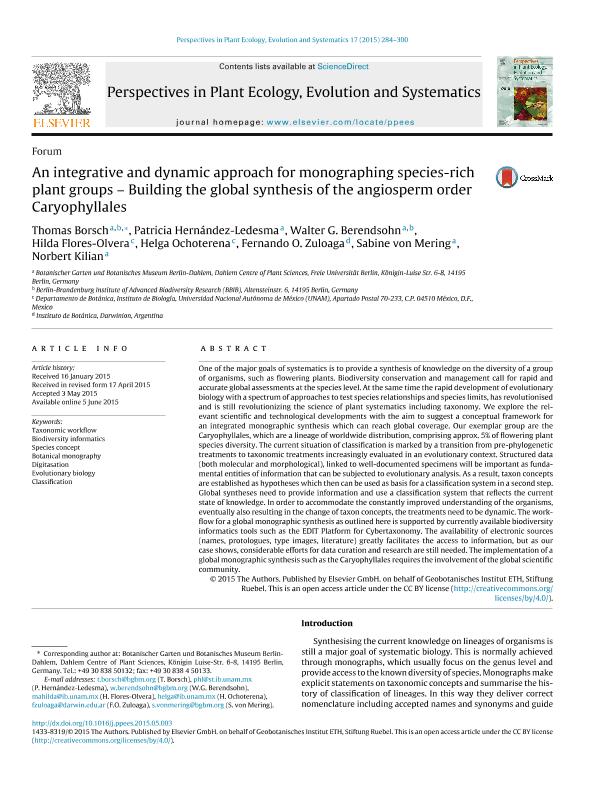Mostrar el registro sencillo del ítem
dc.contributor.author
Borsch, Thomas
dc.contributor.author
Hernández Ledesma, Patricia
dc.contributor.author
Berendsohn, Walter G.
dc.contributor.author
Flores Olvera, Hilda
dc.contributor.author
Ochoterena, Helga
dc.contributor.author
Zuloaga, Fernando Omar

dc.contributor.author
von Mering, Sabine
dc.contributor.author
Kilian, Norbert
dc.date.available
2017-06-26T23:58:51Z
dc.date.issued
2015-07
dc.identifier.citation
Borsch, Thomas; Hernández Ledesma, Patricia; Berendsohn, Walter G.; Flores Olvera, Hilda; Ochoterena, Helga; et al.; An integrative and dynamic approach for monographing species-rich plant groups – Building the global synthesis of the angiosperm order Caryophyllales; Elsevier Gmbh; Perspectives in Plant Ecology Evolution and Systematics; 17; 4; 7-2015; 284-300
dc.identifier.issn
1433-8319
dc.identifier.uri
http://hdl.handle.net/11336/18978
dc.description.abstract
One of the major goals of systematics is to provide a synthesis of knowledge on the diversity of a group of organisms, such as flowering plants. Biodiversity conservation and management call for rapid and accurate global assessments at the species level. At the same time the rapid development of evolutionary biology with a spectrum of approaches to test species relationships and species limits, has revolutionised and is still revolutionizing the science of plant systematics including taxonomy. We explore the relevant scientific and technological developments with the aim to suggest a conceptual framework for an integrated monographic synthesis which can reach global coverage. Our exemplar group are the Caryophyllales, which are a lineage of worldwide distribution, comprising approx. 5% of flowering plant species diversity. The current situation of classification is marked by a transition from pre-phylogenetic treatments to taxonomic treatments increasingly evaluated in an evolutionary context. Structured data (both molecular and morphological), linked to well-documented specimens will be important as fundamental entities of information that can be subjected to evolutionary analysis. As a result, taxon concepts are established as hypotheses which then can be used as basis for a classification system in a second step. Global syntheses need to provide information and use a classification system that reflects the current state of knowledge. In order to accommodate the constantly improved understanding of the organisms, eventually also resulting in the change of taxon concepts, the treatments need to be dynamic. The workflow for a global monographic synthesis as outlined here is supported by currently available biodiversity informatics tools such as the EDIT Platform for Cybertaxonomy. The availability of electronic sources (names, protologues, type images, literature) greatly facilitates the access to information, but as our case shows, considerable efforts for data curation and research are still needed. The implementation of a global monographic synthesis such as the Caryophyllales requires the involvement of the global scientific community.
dc.format
application/pdf
dc.language.iso
eng
dc.publisher
Elsevier Gmbh

dc.rights
info:eu-repo/semantics/openAccess
dc.rights.uri
https://creativecommons.org/licenses/by/2.5/ar/
dc.subject
Taxonomic Workflow
dc.subject
Biodiversity Informatics
dc.subject
Species Concept
dc.subject
Botanical Monography
dc.subject
Digitasation
dc.subject
Evolutionary Biology
dc.subject
Classification
dc.subject.classification
Ciencias de las Plantas, Botánica

dc.subject.classification
Ciencias Biológicas

dc.subject.classification
CIENCIAS NATURALES Y EXACTAS

dc.title
An integrative and dynamic approach for monographing species-rich plant groups – Building the global synthesis of the angiosperm order Caryophyllales
dc.type
info:eu-repo/semantics/article
dc.type
info:ar-repo/semantics/artículo
dc.type
info:eu-repo/semantics/publishedVersion
dc.date.updated
2017-06-26T21:34:47Z
dc.journal.volume
17
dc.journal.number
4
dc.journal.pagination
284-300
dc.journal.pais
Alemania

dc.journal.ciudad
Munich
dc.description.fil
Fil: Borsch, Thomas. Freie Universität Berlin; Alemania. Berlin-Brandenburg Institute of Advanced Biodiversity Research; Alemania
dc.description.fil
Fil: Hernández Ledesma, Patricia. Freie Universität Berlin; Alemania
dc.description.fil
Fil: Berendsohn, Walter G.. Freie Universität Berlin; Alemania. Berlin-Brandenburg Institute of Advanced Biodiversity Research; Alemania
dc.description.fil
Fil: Flores Olvera, Hilda. Universidad Nacional Autónoma de México. Departamento de Botánica; México
dc.description.fil
Fil: Ochoterena, Helga. Universidad Nacional Autónoma de México. Departamento de Botánica; México
dc.description.fil
Fil: Zuloaga, Fernando Omar. Consejo Nacional de Investigaciones Científicas y Técnicas. Instituto de Botánica Darwinion. Academia Nacional de Ciencias Exactas, Físicas y Naturales. Instituto de Botánica Darwinion; Argentina
dc.description.fil
Fil: von Mering, Sabine. Freie Universität Berlin; Alemania. Botanischer Garten und Botanisches Museum Berlin-Dahlem; Alemania
dc.description.fil
Fil: Kilian, Norbert. Freie Universität Berlin; Alemania. Botanischer Garten und Botanisches Museum Berlin-Dahlem; Alemania
dc.journal.title
Perspectives in Plant Ecology Evolution and Systematics

dc.relation.alternativeid
info:eu-repo/semantics/altIdentifier/url/http://www.sciencedirect.com/science/article/pii/S1433831915000451
dc.relation.alternativeid
info:eu-repo/semantics/altIdentifier/doi/http://dx.doi.org/10.1016/j.ppees.2015.05.003
Archivos asociados
